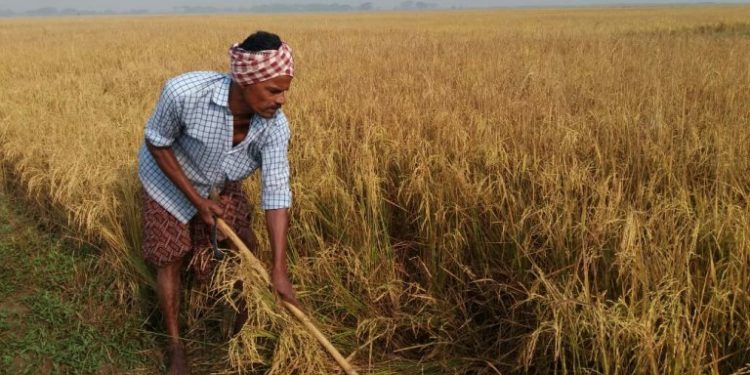Kendrapara: Farmers here are a worried lot as pests have started attacking paddy plants ahead of harvest. Harried farmers seem clueless on how to get rid of the pests.
Sources said heavy rains wreaked havoc on paddy crop as fields remained flooded for days. That forced farmers to spend more on fertilizers.
Meanwhile, paddy has ripened in some fields while in other areas, fields are still wet and the crop has not ripened. Farmers are waiting for the fields to dry up.
Pest attacks have occurred in most parts of Kendrapara, Derabish, Pattamundai and Marshaghai blocks. The pests have started attacking the spikelet of paddy pinnacles.
Farmers now fear that they will have to suffer losses as the yield is going to get reduced due to pest attacks.
The pest whose agronomical name is ‘Tobacco Caterpillar’ and is locally called ‘Kalimunda Poka,’ is nocturnal. It remains at the bottom of the paddy stem during the day and at night it destroys the rice floret.
As a result the floret has dropped from the pinnacle in many areas, said Sarada Prasad Mishra, the District Agriculture Officer (DAO) of Kendrapara.
Farmer Udayanath Barik, 45, of Kansar village is spending sleepless nights thinking how to repay the loan he had taken.
Another farmer Udayanath Barik said, “I took a loan of Rs 35,000 from the coop society and cultivated paddy on three acres. The heavy monsoons and the Titli cyclone destroyed half the plants. Later, as per the suggestion of the Agriculture Department, I applied extra fertiliser to protect the remaining paddy plants. I had decided to start harvesting in the last week of December. But the Tobacco Caterpillar has destroyed half my crop. How can I repay loans now?”
Similarly, another farmer, Smruti Ranjan Swain, of Kansar village, said that he had taken a loan of Rs 49,000 and cultivated paddy on five acres. As the fields were wet he could not harvest the crop. Meanwhile, the Tobacco Caterpillar destroyed his paddy.
District Agriculture Officer Mishra said the Tobacco Caterpillar lays eggs in clusters of several hundreds, usually on the upper surface of paddy leaves. The caterpillars are night feeders and are usually found in the soil around the base of the plants during the day.
The Agriculture Department has been asking farmers to start harvesting immediately in fields where 80 per cent of the paddy had matured. Applying pesticide now is harmful as pesticide residue can remain in the paddy.
He said that if the paddy is semi-ripe and the fields are wet 15 days are required for starting the harvesting process. Then farmers can neutralise the pests by applying 10 kg Chloropyrifos per acre. Chloropyrifos dusting should be done during the evenings or farmers should spray Profenofos, said Satyabrata Sahu, the Pest Surveillance Officer of Kendrapara.
There is every possibility that the Tobacco Caterpillar would attack the black gram and green gram crop too. The Agriculture Department has already asked farmers to use Chloropyrifos and Profenofos to tackle the pests.
Chloropyrifos is not available in the district and farmers are purchasing it from Cuttack.
The Agriculture Department has asked pesticide dealers to store it for farmers of the district, said DAO Mishra. As per official reports, in the Kharif season paddy was cultivated in around 1,24,600 hectares in the district.
PNN







































